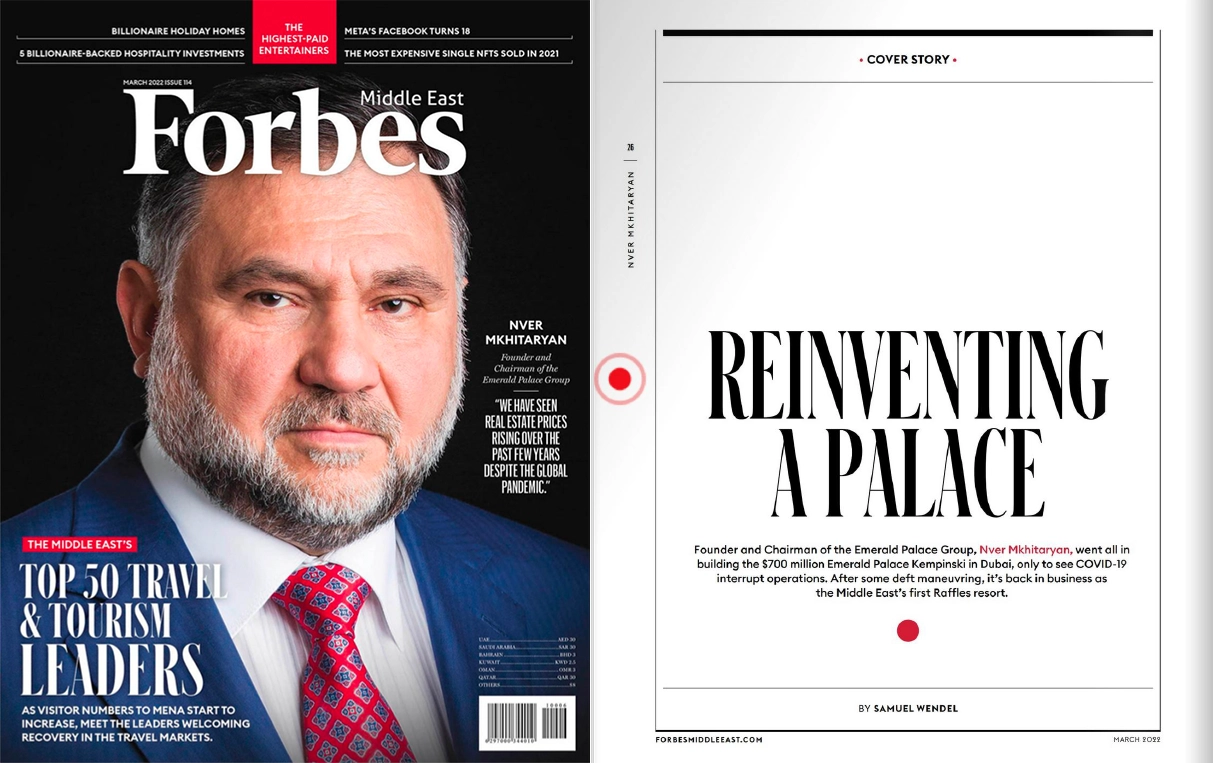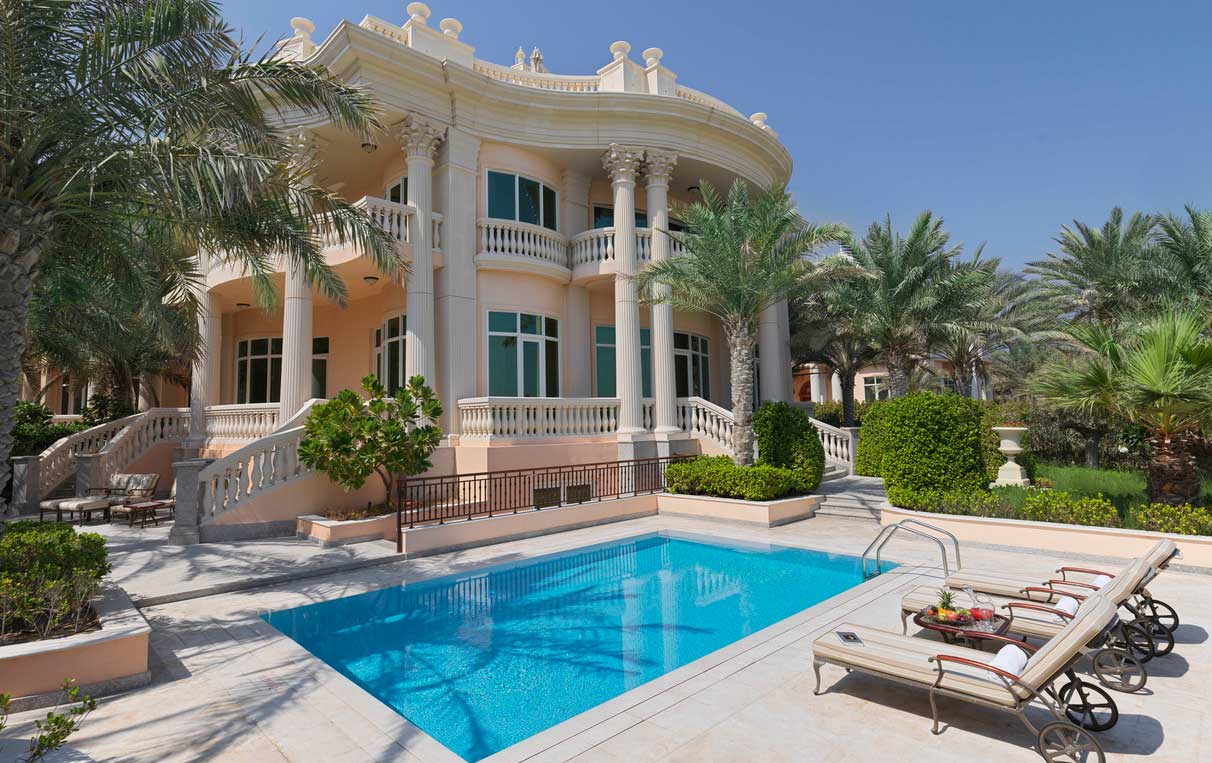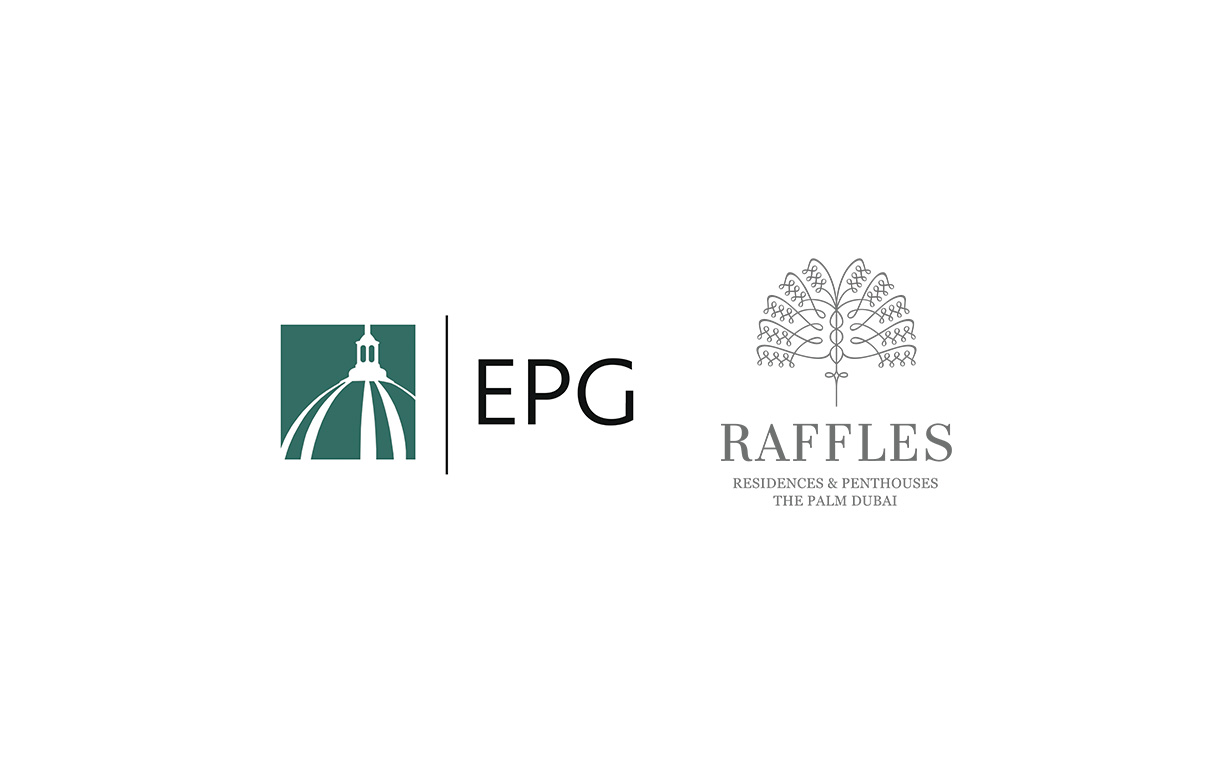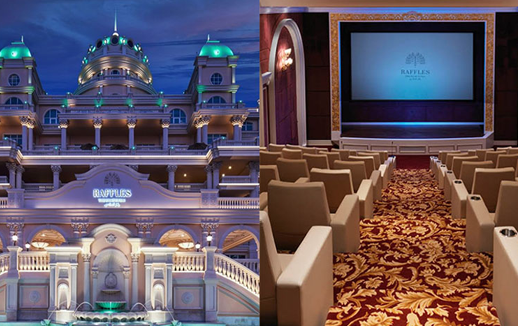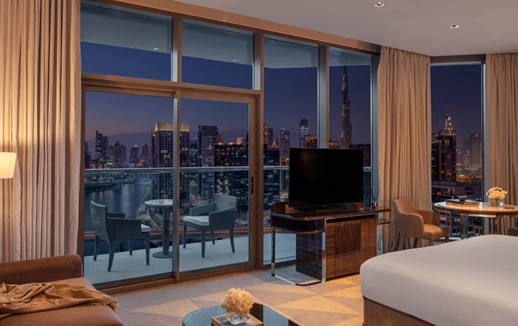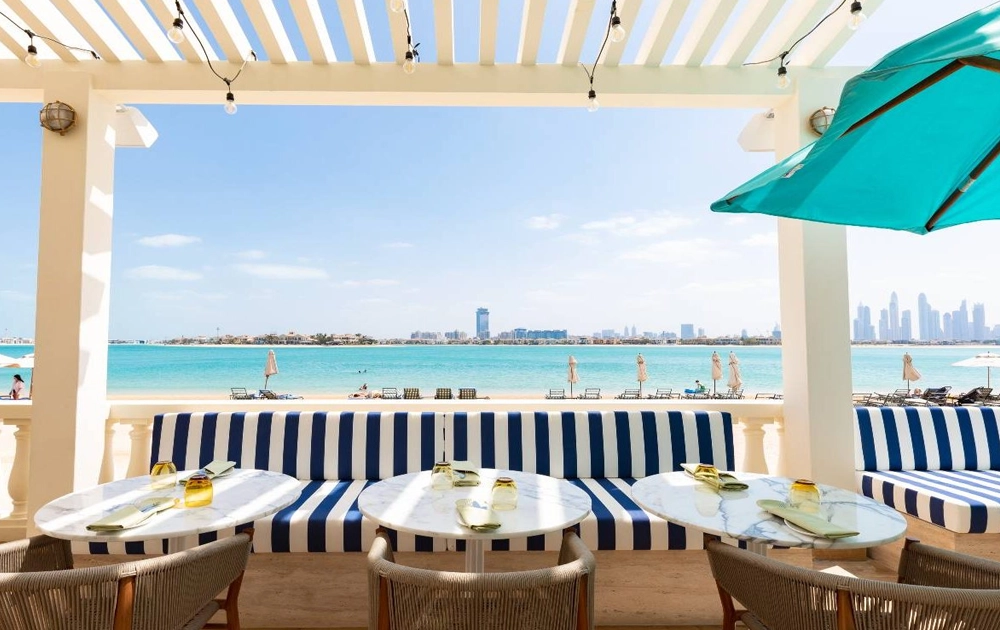For much of the pandemic, one of Dubai's most opulent new hotels sat largely empty. The Emerald Palace Kempinski Dubai, which opened to fanfare in late 2018 and cost around $700 million to develop, was the creation of real estate developer Nver Mkhitaryan. He envisioned it as a European palace fit for royalty: occupying a prime waterfront plot on the glitzy Palm Jumeirah, the hotel features over 6,000 Swarovsk.i chandeliers and columns of pink Portuguese marble, with manicured gardens and swanky villas overlooking a private beach with sand imported from the Maldives.
But less than two years after opening, the property's future was thrown into doubt, as the resort shut down after COVID-19 began to spread globally in early 2020. Even as Dubai orchestrated one of the world's fastest vaccine rollouts and local tourism began to recover, the palatial property stayed closed. Then came the news in May 2021 that Kempinski was no longer going to manage the property.
Yet, behind the scenes, people worked to keep the regal hotel ready for business. Engineers, cleaners, security, and in-house interior specialists focused on maintenance and upkeep, while air conditioning was kept running to ensure the empty five-star hotel and its 391 rooms and suites stayed in perfect condition. And the property wasn't entirely without guests: social media posts from Conor McGregor in early 2021 revealed that the MMA fighter was using one of its private villas.
"No one looking at the hotel from the outside would have noticed that the hotel was in fact closed," says Mkhitaryan, founder of the Emerald Palace Group, which owns the hotel. The Armenian-born entrepreneur launched the holding company in 2005 to develop luxury projects in the U.A.E. and beyondbut none attracted the level of international attention garnered by the flagship hotel. So, with the future of his marquee property in flux, Mkhitayan stayed busy too. Following Kempinski's exit, he quickly inked a partnership with the hospitality group Accor to rebrand the hotel as Raffles The Palm Dubai. That saw the property finally reopen in September 2021 and become the first Raffles resort in the Middle East. The rates match the royal surroundings: rooms usually start at roughly $600 per night in peak season and run up to more than $11,000 per person for a villa.
The move from Accor comes as the French company is expanding in the Middle East and the Emerald Palace Group's idle hotel offered an opportunity it couldn't resist. There are few beach resort plots left in Dubai and none on the Palm Jumeirah, according to Mark Wi1lis, Accor's regional CEO. Already, the exec likes what he's seeing from the property. "The launch of Raffles The Palm Dubai a short few months ago has already exceeded all expectations," says Willis.
"Our goal is to position Rafllcs The Palm as the leading luxury resort in the Middle East."
Mkhitaryan seems pleased ,vith the partnership too. He believes the Raffles brand provides the market penetration and awareness that he's looking for and he reports the hotel has already hosted dignitaries, celebrities, and some of the most exclusive weddings in the Middle East. "Our goal is to position Raffles The Palm as the leading luxury resort in the Middle East," says Mkhitaryan.
That's quite a goal in a market known for world class hotels (not to mention the Burj Al Arab, which is sometimes described as a seven-star resort). But Mkhitaryan's ambitions don't end there. A Dubai transplant who rose to prominence as a real estate developer in Ukraine, Mkhitaryan still wants to raise the stakes even higher. "Sometimes I catch myself thinking, why didn't I build the Burj Khalifa?" he says. "However, I'm sure that the Burj Khalifa of my life is still ahead."
Still, his plans have had to contend with COVID- 19, which hit the tourism and hospitality space hard globally. Emerald Palace Group carefully managed costs during the pandemic, while also realigning and restructuring its business. Yet, Mkhitaryan remained bullish on Dubai's potential despite the challenges and continued developing projects. In late 2021 that saw the group deliver another new five-star hotel in Dubai's Business Bay, launched in conjunction with Accor under its Hyde hotel brand, making it the first international location for the brand outside the U.S.
Going forward, Mkhitaryan sees ample promise in Dubai's future as a hub for travel and business after the emirate served as a safe haven during the pandemic. As evidence, he cites Expo 2020 as positioning the city as a key destination for tourists, while moves like the U.A.E.'s Golden Visa are making it an attractive location for new investments. "We have seen real estate prices rising over the past few years despite the global pandemic," he says. "Once again, it shows confidence in Dubai."
So, when will we see his next headline-grabbing project in Dubai? Mkhitaryan reports the group is planning significant projects on property it owns on the Palm Jebel Ali and Dubai Waterfront, although he doesn't provide specifics. The developer emphasizes that Dubai is a focus area for his group, but he's also actively working on a luxury resort in France's Courchevel and another in the Maldives.
Whatever comes next, expect him to take a handson approach; Mkhitaryan has garnered a reputation as an owner who stays closely involved in projects. For instance, he reports having personally approved every element used in the construction of the Emerald Palace hotel. "There can be points within the construction stages that many people would not notice and can be costly to implement," explains Mkhitaryan. "If l can see that such improvements, will deliver a better product I will always commit the extra funds." That has caught some by surprisethe former hotel manager of the Emerald Palace Kempinski Dubai was once quoted in a news report as saying Mkhitaryan's personal involvement and attention to detail was partly responsible for project delays. Either way, the developer certainly brings a wealth of experience and knowledge to his craft.
His path to Dubai began in Soviet Armenia, where Mkhitaryan was born in 1960. The son of a famous writer, he grew up surrounded by thousands of books. But rather than take up the pen too, he chose to study architecture and construction. After graduating from Armenia's Yerevan Polytechnic Institute in 1982, Mkhitaryan was assigned a role working on the construction of a new sports facility in the country's capital. Not long after that, at age 26, he was put in charge of a construction materials factory. From there, he moved to Ukraine in the 1990s and earned his PhD from the Kyiv National University of Building and Architecture.
There he also became a Ukrainian citizen and soon spotted an opportunity to make a name for himself. Seeing a lack of affordable new housing in the newly independent Ukraine, in 1996 Mkhitaryan invested $10,000 to launch the private real estate development company Poznyakizhilstroy. He began building apartments; by the early 2000s the company employed over 25,000 people. As the company grew, his eldest son Artur Mkhitaryan joined the firm, starting out as an advertising manager before rising to become its business manager. Artur reports his father brought something new to the market in Ukraine. "You could say he was a pioneer," says Artur, pointing to how Poznyakizhilstroy was the first company to use monolithic frame technology in highrise construction in the country, helping change the industry landscape.
But Mkhitaryan was also starting to look beyond Ukraine for business opportunities, leading to the formation of the Emerald Palace Group in 2005. Dubai was on his radar, particularly the recently developed Palm Jumeirah. Mkhitaryan began looking at plots on the man-made island and forged a strategic partnership with Kempinski. Emerald Palace Group completed its first project in Dubai by 2010, when it launched the Kempinski Hotel and Residences on the Palm Jumeriah.
A busy man, Mkhitaryan had also been making his mark outside of real estate, which included authoring scientific publications, becoming a professor, and briefly entering politics, but in 2014 he relocated to Dubai to focus on the Emerald Palace Group. Artur had by then taken the reins at Poznyakizhilstroy, which he folded into a new company called Taryan Group in 2015. Meanwhile, Mkhitaryan started an
"We have seen real estate prices rising over the past few years despite the global pandemic."
Ambitious new project on a plot ofland next to the Kempinski Hotel and Residences. To finance development, a subsidiary of his group secured roughly $140 million in financing from Emirates NBD and Doha Bank in 2015.
The developer held little back for his new hotel, sourcing materials and accessories from high-end European manufacturers, including over 30,000 pieces of furniture from Italy alone. Mkhitaryan even traveled to Portugal and went down into a mine to hand-select marble himself. Housed on a 100,000 square meter plot, the hotel was set to include a range of facilities, from a cinema to a spa created in partnership with France's Cinq Mondes. On the dining front, the hotel brought in Michelin-starred chef Alain Ducasse to open a restaurant called Mix.
The Emerald Palace project took over three years to complete and its arrival was hotly anticipated. By then Mkhitaryan was already preparing to launch his next hotel in Dubai, dubbed the Kempinski Business Bay. Located in the emirate's central business district, it was expected to open in 2020-but then came COVID-19. The group would eventually complete the project alongside Accor instead and launch it as a Hyde hotel. While navigating that delay, the group also dealt ,vith the Emerald Palace Kempinski Dubai's closure and management turnover. It helped that the Kempinski Hotel and Residences continued to run successfully, thanks to high demand for rentals during the pandemic, says Mkhitaryan.
Now, ater a turbulent saga, it's . Raffles The Palm Dubai's turn to deliver results. The property's reopening came with certain changes to reflect the Raffles brand-such as a ,vriter's lounge and library-but Mkhitaryan's original vision for the palatial property remains plain to see. With his prized hotel once again giving guests the royal treatment, Mkhitaryan can now continue expanding his real estate empire. Not to be overlooked is a more personal project: dynasty building.
Under Artur, Taryan Group has become a key firm in Ukraine's luxury real estate market. "Trust me the buildings he's currently building are the best in Europe," says his father. Meanwhile, his middle son, Ivan, is also pursuing a career in construction after graduating from the American University in Dubai. In the future, Mkhitaryan expects his children to continue what he's started, even as the developer still dreams of creating a Bmj Khalifa of his own. "Even ifl cannot do it, my kids can," says Mkhitaryan.
THE MIDDLE EAST'S
TOP 50 TRAVEL & TOURISM LEADERS
The travel and tourism industry experienced a revival in 2021, following one of the worst years the sector has ever seen. As countries and people continue to emerge from the cloud of the pandemic, their increasing desire to reconnect with the world is expected to become the driving force of growth in travel throughout 2022.
Though the industry has not yet returned to pre-pandemic levels, its recovery so far has been significant. For example, Jordan's Queen Alia International Airport welcomed 122% more passengers in 2021 than it did in 2020. And the hotel sector is also poised for growth, with Marriott International expected to open around 25 new properties in the region this year.
Some new trends have also had an impact. Working remotely has today become commonplace for many employees, with big tech companies like Twitter, Meta, and Amazon leading the way. This means that hospitality venues are being used as make-shift offices for travelers, as well as residents seeking a change in their working environment. On the financial side, most travel companies are now favoring an asset-light approach. The separation between the management of operations and real-estate assets now allows hospitality companies to focus on their core business.
This month we release our first ranking of the Middle East's Top 50 Travel & Tourism Leaders. The U.A.E. dominates, with 24 leaders featured based in the emirates, followed by 11 in Saudi Arabia, and four in Egypt. The hotels and hospitality sector is the most dominant with 26 entries, followed by aviation with 17, and tourism with seven entries.
Methodology
For this ranking, we included leaders that span across the entire travel ecosystem, including aviation, hotels, and destinations. All individuals had to be based in the Middle East. We ranked them based on:
• Size of the business, including revenue, values ofinvestments, and asset value.
• Ownership of assets.
• Designation of the business leader.
• Experience of the business leader.
• Degree of influence of the business leader.
• Other achievements of the business leader.
37. Nver Mkhitaryan
Founder and Chairman
Company: Emerald Palace Group (EPG)
Country: U.A.E.
Nationality: Ukrainian
Sector: Hotels & Hospitality
Mkhitaryan founded EPG in 2005 to design and develop the Emerald Palace Kempinski Dubai and the Kempinski Hotel & Residences Palm Jumeirah. The Emerald Palace hotel alone has 391 rooms. In 2021, the Accor Group announced that it would be takjng over the operations of the Emerald Palace Kempinski Dubai, replacing Kempinski to create Raffles The Palm Dubai, the first Raffles resort in the Middle East. Accor has also collaborated with EPG to construct the Hyde Dubai Business Bay, which is the first Hyde branded hotel outside the U.S. Mkhitaryan started his career in 1996 when he launched a private real estate development company, Poznyakizhilstroy, in Ukraine.

